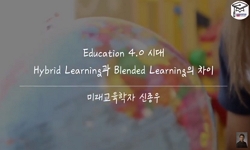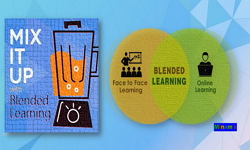정보통신기술의 발달로 인해 원격교육은 e-learning이라는 새로운 이름으로 붐을 이루었다. 하지만 e-learning은 체험학습의 어려움, 암묵적 지식 전달의 어려움, 비언어적 의사전달의 어려움 등 ...
http://chineseinput.net/에서 pinyin(병음)방식으로 중국어를 변환할 수 있습니다.
변환된 중국어를 복사하여 사용하시면 됩니다.
- 中文 을 입력하시려면 zhongwen을 입력하시고 space를누르시면됩니다.
- 北京 을 입력하시려면 beijing을 입력하시고 space를 누르시면 됩니다.

Blended Learning의 의미와 상호작용 설계원리에 대한 고찰 = Design Principles of Interactions for Blended Learning
한글로보기https://www.riss.kr/link?id=A75428856
- 저자
- 발행기관
- 학술지명
- 권호사항
-
발행연도
2007
-
작성언어
-
- 주제어
-
KDC
373.305
-
등재정보
KCI등재
-
자료형태
학술저널
-
수록면
225-250(26쪽)
- 제공처
-
0
상세조회 -
0
다운로드
부가정보
국문 초록 (Abstract)
정보통신기술의 발달로 인해 원격교육은 e-learning이라는 새로운 이름으로 붐을 이루었다. 하지만 e-learning은 체험학습의 어려움, 암묵적 지식 전달의 어려움, 비언어적 의사전달의 어려움 등 다양한 문제의 발생으로 오프라인 학습활동과 병행한 blended learning의 필요성이 대두되었다. blended learning은 아직 그 개념적 정의에서도 합의에 이루지 못하고 있으며 실천을 위한 설계원리에 대한 연구도 절실히 필요한 시기이다. 본 연구는 문헌연구를 통해 기존의 blended learning의 개념을 정립하고 현장 실천을 위한 blended learning의 상호작용 설계원리를 제시하였다. 본 연구에서는 blended learning을 세 가지 준거 즉 1) 온라인과 오프라인의 통합한 all-line 학습, 2) 단순한 두 환경의 통합이 아닌 효과성, 효율성, 매력성을 높이기 위한 학습과학적 접근, 3) 학습자 중심의 접근이라는 준거에 근거하여 개념 정의하였다. 또한 본 연구는 본 연구는 blended learning의 상호작용 설계 원리로 상호작용 확대 원리, 상호작용 정교화 원리, 상호작용 평등화 원리, 상호작용 공유의 원리, 상호작용 비용효과성 원리 등 총 5개의 범주 하에 20개의 원리를 논의하였다. 본 연구는 새롭게 등장하는 blended learning에 대한 개념적 합의를 유도하였고 현장 실천을 위한 처방적 상호작용 설계지침을 제공해 줄 수 있을 것이다.
다국어 초록 (Multilingual Abstract)
The development of ICT provoke diffusion of e-learning. However e-learning show a variety of problems such as difficulties of experience-based learning, delivering implicit knowledge, and non-verbal communication. These kinds of problems bring a new c...
The development of ICT provoke diffusion of e-learning. However e-learning show a variety of problems such as difficulties of experience-based learning, delivering implicit knowledge, and non-verbal communication. These kinds of problems bring a new concept of blended learning which is integrating online and offline learning environments. The blended learning have lots of problems. The researchers still do not reach the agreed concept about blended learning. Also there is no study about design principles of blended learning. The study defined blended learning in three criterions: 1) all-line learning integrating online and offline, 2) a learning scientific approach to achieve effective, efficient, and attractive learning, 3) learner-centered approach to enhance satisfaction of learning and access to learning. The study provides design principles of interactions based on the existing interaction theories in both online and offline environment. The design principles include five categories and total 20 principles: enlargement of interaction; elaboration of interaction; equalization of interaction; co-ownership of interaction; cost-effectiveness of interaction.
동일학술지(권/호) 다른 논문
-
e-Learning 환경에서 학습자 및 학습과정 특성에 따른 학습전략 차이 분석
- 한국교육정보미디어학회(구 한국교육정보방송학회)
- 이수경 ( Soo Kyoung Lee )
- 2007
- KCI등재
-
사이버가정학습 우수운영사례 질적 연구: 운영유형별 핵심성공요인 분석을 중심으로
- 한국교육정보미디어학회(구 한국교육정보방송학회)
- 김도헌 ( Do Hun Kim )
- 2007
- KCI등재
-
- 한국교육정보미디어학회(구 한국교육정보방송학회)
- 김세리 ( Se Ri Kim )
- 2007
- KCI등재
-
- 한국교육정보미디어학회(구 한국교육정보방송학회)
- 임병노 ( Byung Ro Lim )
- 2007
- KCI등재





 KCI
KCI KISS
KISS




